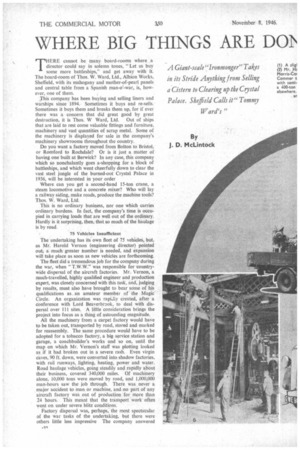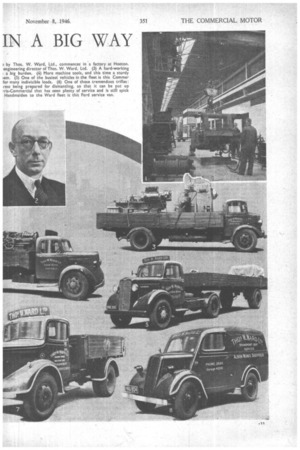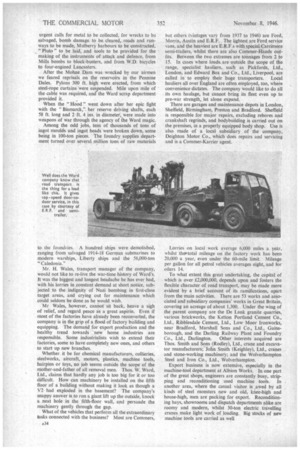WHERE BIG THINGS ARE D01\
Page 34

Page 35

Page 36

If you've noticed an error in this article please click here to report it so we can fix it.
IN A BIG WAY THERE cannot be many board-rooms where ,a director could say in solemn tones, "Let us buy some more battleships," and get away with it. The board-room of Thos. W. Ward, Ltd., Albion Works, Sheffield, with its mahogany and mother-of-pearl panels and central table from a Spanish rnan-o'-war, is, how
ever, one of them. , This company has been buying and selling liners and warships since 1894. Sometimes it buys and re-sells. Sometimes it buys them and breaks them up, for if ever there was a concern that did great good by great destruction, it is Thos. W Ward, Ltd. Out of ships that are laid to rest come valuable fittings and furniture, machinery and vast quantities of scrap metal. Some of the machinery is displayed for sale in the company's machinery showrooms throughout the country.
Do you want a factory moved from Bolton to Bristol, or Romford to Rochdale? Or is it just a matter of having one built at Berwick? In any case, this company which so nonchalantly goes a-shopping for a block of battleships, and which went cheerfully down to clear the vast steel jungle of the burned-out Crystal Palace in 1936, will be interested in your order
Where can you get a second-hand 15-ton crane, a steam locomotive and a concrete mixer? Who will lay a railway siding, make roads, produce the machine tools? Thos. W. Ward, Ltd.
This is no ordinary business, nor one which carries ordinary burdens. In fact, the company's time is occupied in carrying loads that are well out of the ordinary. Hardly is it surprising, then, that so much of the haulage is by road.
75 Vehicles Insufficient The undertaking has its own fleet of 75 vehicles, but, as Mr. Harold Vernon (engineering director) pointed out a much greater number is needed, and expansion will take place as soon as new vehicles are forthcoming.
The fleet did a tremendous job for the company during the war, when " T.W.W." was responsible for -countrywide dispersal of the aircraft factories. Mr. Vernon, a much-travelled, highly qualified engineer and production expert, was closely concerned with this task, and, judging by results, must also have brought to bear some of his qualifications as. an amateur member of the Magic Circle. An organization was rapidly created, after a conference with Lord Beaverbrook, to deal with dispersal over 1 1 l sites. A little consideration brings the project into focus as a thing of astounding magnitude.
All the machinery from a carpet factory would have to be taken out, transported by road, stored and marked for reassembly. The same procedure would have to be adopted for a tobacco factory, a big service station and garage, a coachbuilder's works and 'so on, until the map on which Mr. Vernon's staff was plotting looked as if it had broken out in a severe rash. Even virgin caves, 90 ft. down, were converted into shadow factories, with rail runways, lighting, heating, power and water. Road haulage vehicles, going steadily and rapidly about their business, covered 340,000 miles. Of machinery alone, 10,000 tons were moved by road, and 1,000,000 man-hours saw the job through. There was never a major accident to man or machine, and no part of any aircraft factory was out of production for more than 24 hours. This meant that the transport work often went on under severe blitz conditions.
Factory dispersal was, perhaps; the most spectacular of the war tasks of the undertaking, but there were others little less impressive The company answered urgent calls for metal to be collected, for wrecks to be salvaged, bomb damage to be cleared, roads and runways to be made, Mulberry harbours to be constructed, " Pluto " to be laid, and tools to be provided for the making of the instruments of attack and defence, from Mills bombs to block-busters, and from W.D. bicycles to four-engined Lancasters.
After the Moline Dam was wrecked by our airmen we feared reprisals on the reservoirs in the Pennine Dales. Pylons 300 ft. high were erected, from which steel-rope curtains were suspended. Mile upon mile of the cable was required, an the Ward scrap department provided it. When the " Hood " went down after her epic fight with the "Bismarck," her reserve driving shafts, each 58 ft. long and 2 ft. 4 ins, in diameter, were made into weapons of war through the agency of the Ward magic.
Among the odd jobs, tens of thousands of tons of ingot moulds and ingot heads were broken down, some being in 100-ton pieces. The foundry supplies department turned over several million tons of raw materials to the foundfies. A hundred ships were demolished, ranging from salvaged 1914-18 German submarines to modern warships, Liberty ships and the 56,000-ton "Caledonia."
Mr. H. Wales, transport manager of the company, would not like to re-live the war-time history of Ward's. It was the biggest and longest headache he has ever had, with his lorries in constant demand at short notice, subjected to the indignity of Nazi bombing in first-class target areas, and crying out for maintenance which could seldom be done as he would wish.
Mr Wales, however, cannot sit back, heave a sigh of relief, and regard peace as a great aspirin. Even if most of the factories have already been reconverted, the company is in the grip of a flood of factory building and equipping. The demand for export production and the healthy trend towards ' new home industries are responsible. Some industrialists wish to extend their factories, some to have completely new ones, and others to start up new branches.
Whether it be for chemical manufacturers, collieries, steelworks, aircraft, motors, plastics, machine tools, hairpins or toys, no job seems outside the scope of the mother-and-father of all removal men. Thos. W. Ward, Ltd., claims that hardly any job is too big for it or too difficult. How can machinery be installed on the fifth floor of a building without making it look as though a V2 had exploded in the basement? The company's snappy answer is to run a giant lift up the outside, knock a neat hole in the fifth-floor wall, and persuade the machinery gently through the gap.
What of the vehicles that perform all the extraordinary tasks connected with the business? Most are Commers, A34 but others (vintages vary from 1937 to 1946) are Ford, Morris, Austin and E.R.F. The lightest are Ford service vans, and the heaviest are E.R.F.s with special Carrimore semi-trailers, whilst there are also Commer-Hands outfits. Between the two extremes are tonnages from 2 to 15. In cases where loads, are outside the scope of the range, specialist hauliers, such as Pickfords, Ltd., London, and Edward Box and Co., Ltd., Liverpool, are called in to employ their huge transporters. Local hauliers all over England are often employed, too, where convenience dictates. The company would like to do all its own haulage, but cannot bring its fleet even up to pre-war strength, let alone expand.
There are garages and maintenance depots in London, Sheffield, Birmingham, Preston and Bradford. Sheffield is responsible for major repairs, excluding rebores and crankshaft regrinds, and bodybuilding is carried out on the premises, in a properly equipped body shop. Use is also made of a local subsidiary of the company, Deighton Motor Co., which does repairs and servicing and is a Commer-Karrier agent.
Lorries on local work average 6,000 miles a year, whilst thestotal mileage on the factory work has been 20,000 a year, even under the 60-mile limit. Mileage per gallon for all petrol vehicles averages eight, and For oilers 14.
To what extent this great undertaking, the capital of which is over £2,000,000, depends upon and fosters the flexible character of road transport, may be made more evident by a brief account of its ramifications, apart from the main activities. There are 53 works and associated and subsidiary companies' works in Great Britain, covering an acreage of about 1,300. Under the wing of the parent company are the De Lank granite quarries, various brickworks, the Ketton Portland Cement Co., Ltd., Ribblesdale Cement, Ltd., Low Moor Ironworks, near Bradford, Marshall Sons and Co., Ltd., Gainsborough, and the Darling Railway Plant and Foundry Co., Ltd., Darlington. Other interests acquired are Thos. Smith and Sons (Rodley), Ltd., crane and excavator manufacturers; 'John Smith (Keighley), Ltd., cranes and stone-working machinery; and the Wolverhampton Steel and Iron Co., Ltd., Wolverhampton.
Export business is now extensive, especially in the machine-tool department at Albion Works. In one part of the great shops, engineers are constantly busy, stripping and reconditioning used machine tools. In another area, where the casual visitor is awed by all kinds of steel monsters new and old, knee-high and house-high, men are packing for export. Reconditioning bays, showrooms and dispatch departments alike are roomy and modern, whilst 30-ton electric travelling cranes make light work of loading. Big stocks of new machine tools are carried as well




































































